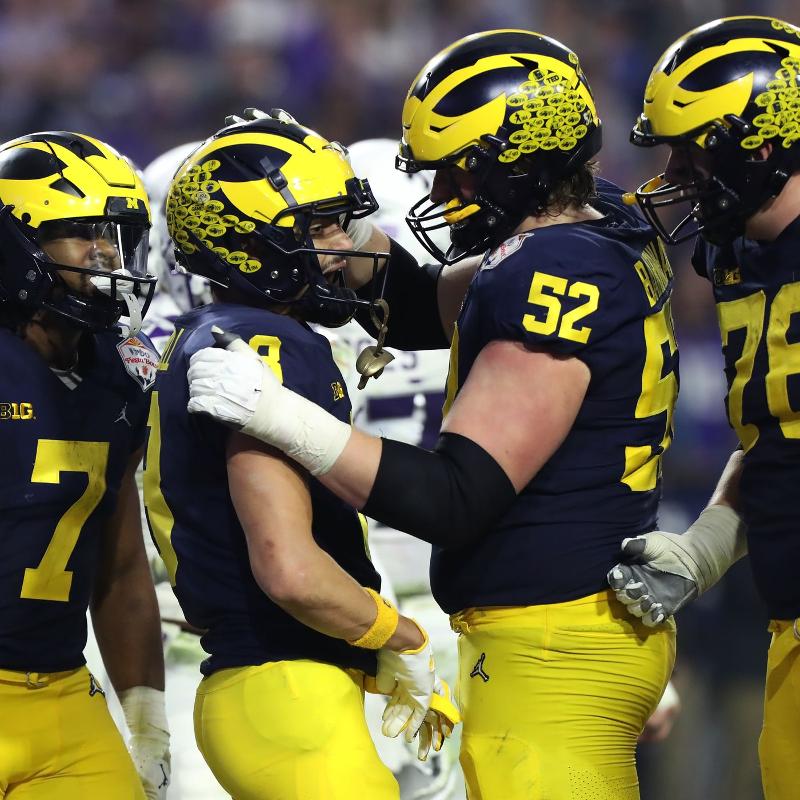The University of Michigan and head coach Jim Harbaugh have a strategic plan for developing young talent. By allowing them to play earlier in games, they are not only seeking an immediate advantage but also building for the future. This article explores the significance of this approach and how it cultivates confidence, maturity, and preparedness in the Wolverines' players.
The Importance of Early Game Time
Discover why the University of Michigan allows young players to play earlier in games and how it benefits their development.
Playing in actual games provides young players with valuable experience that cannot be replicated in practice. It allows them to gain confidence, maturity, and a better understanding of the game.
According to head coach Jim Harbaugh, there is a significant turning point for freshmen around game seven, where they start to come into their own. By giving them playing time early on, the Wolverines are setting them up for success in future seasons.
Wide receiver Cornelius Johnson emphasizes the difference between game day and practice, highlighting the importance of experiencing the intensity and pressure of real game situations. This game day experience translates into better preparation and visualization for future seasons.
Tight end Colston Loveland shares how playing early in his career helped him mature and feel more confident in his abilities. The game time experience made it easier for him to transition into subsequent seasons, both physically and mentally.
Playing in big games against tough competition also helps young players like Mason Graham develop their skills and build confidence. The experience gained early on prepares them for the challenges they will face in the future.
The Value of Game Reps for Freshmen
Explore why getting game reps is crucial for freshmen and how it contributes to their growth and development as players.
Even if not every freshman gets significant playing time, every opportunity to get on the field is meaningful. Whether it's in blowout games or spot situations, these game reps contribute to their development and pave the way for future success.
Safety Keon Sabb, who played in just four games in his freshman year, shares how watching and learning from older players prepared him for his turn on the field. The guidance and teachings of his teammates and coaches helped him apply his knowledge when his time came.
Offensive tackle Karsen Barnhart took a longer road to becoming a starter for Michigan. Despite limited playing time in his freshman year, he learned from experienced linemen and observed their techniques. This observation and learning process improved his game over time.
By getting game reps early on, freshmen gain valuable experience, learn from their peers, and develop the necessary skills to contribute to the team in the future. These game reps are stepping stones towards their growth and success.
Harbaugh's Investment in the Future
Learn about Jim Harbaugh's approach to developing young talent and how it benefits the University of Michigan's football program in the long run.
Jim Harbaugh understands the importance of investing in the future of the program. By giving young players opportunities to play early, he is not only seeking immediate advantages but also building a strong foundation for the team's future success.
Harbaugh believes that around game seven, freshmen start to come into their own and show their potential. By allowing them to play and gain experience, he is nurturing their confidence, maturity, and preparedness for future seasons.
Players like Mason Graham, who played in all 14 games as a freshman, have benefited greatly from Harbaugh's approach. The game time experience in big games against tough competition has helped Graham develop his skills and build confidence.
Harbaugh's strategy of giving young players game reps not only benefits the team in the present but also sets them up for success in the seasons to come. It creates a pipeline of talented and experienced players who can contribute to the program's long-term success.
Conclusion
The University of Michigan's strategy of giving young players early game time is a testament to their commitment to developing talent for the future. By allowing freshmen to gain valuable experience, the Wolverines are building a strong foundation for success in the seasons to come. The confidence, maturity, and preparedness cultivated through these game reps will undoubtedly benefit the team in the long run.
FQA
Why is early game time important for player development?
Early game time provides young players with valuable experience, allowing them to gain confidence, maturity, and a better understanding of the game. It prepares them for future challenges and contributes to their growth as players.
How does playing early in their careers benefit freshmen?
Playing early in their careers helps freshmen mature faster and feel more confident in their abilities. It eases their transition into subsequent seasons and improves their physical and mental preparedness.
What is Jim Harbaugh's approach to developing young talent?
Jim Harbaugh believes in investing in the future of the program by giving young players opportunities to play early. He understands that freshmen start to come into their own around game seven and nurtures their confidence, maturity, and preparedness for future seasons.

